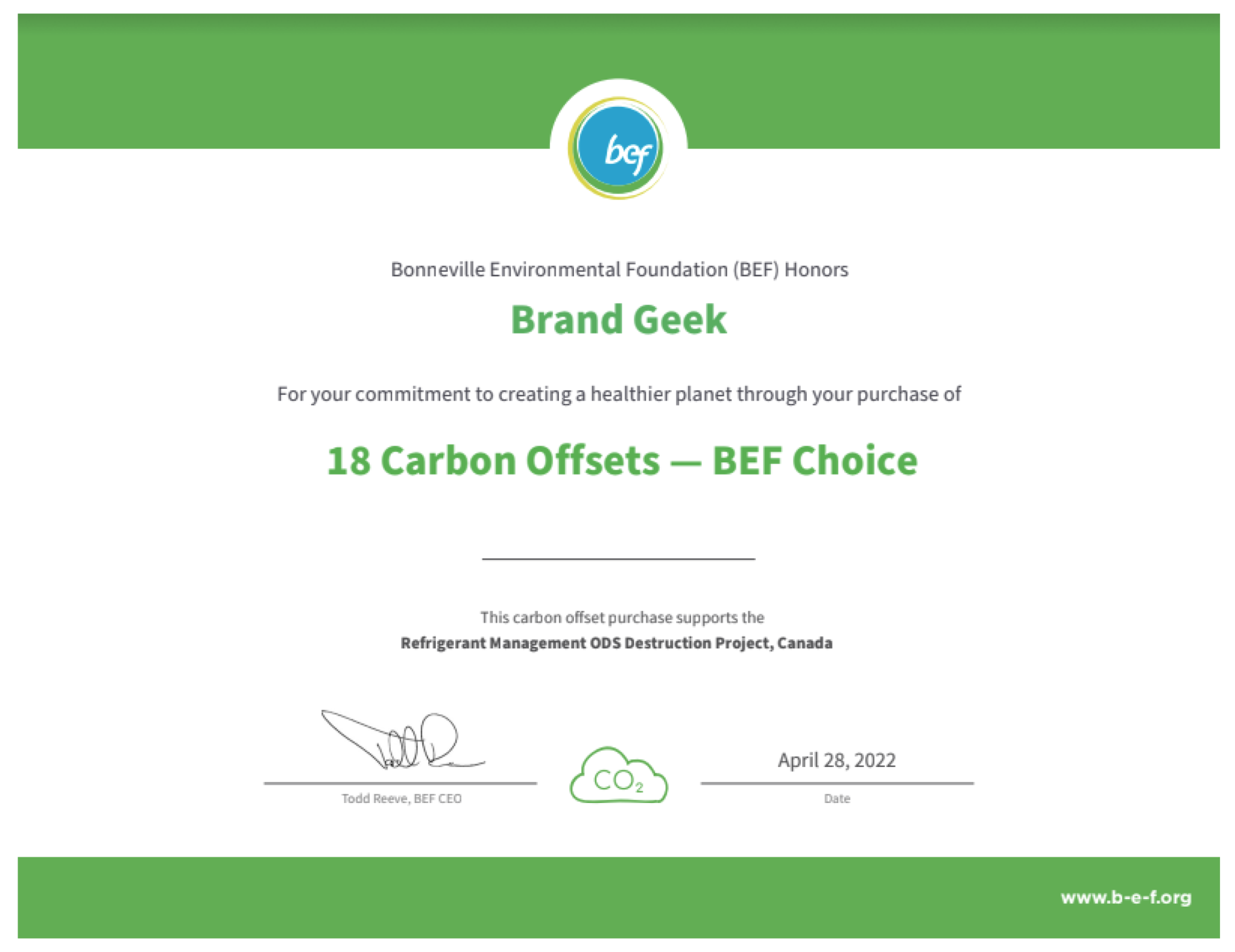Brandgeek proudly supports Mountain Area Preservation and is humbled to be…
Watch out greenwashers; here comes the FTC
The Federal Trade Commission (“FTC”) was created in 1914 to regulate unfair trade practices. It issued its first set of Guides for the Use of Environmental Marketing Claims (commonly known as the Green Guides) in 1992, which it then updated in 1996 and 1998. The Green Guides are meant to provide guidance to marketers so they can avoid making unfair and/or deceptive environmental advertising claims. Imagine that! Technically, the Green Guides informally interpret Section 5 of the FTC Act (15 U.S.C. §§ 41-58) (“The Act”), which governs unfair and/or deceptive advertising claims, including claims about environmental benefits and practices. Essentially, the Guides are a play book for how to stay out of trouble with the FTC.
First, the Green Guides outline general principles applicable to all environmental marketing claims and make suggestions for avoiding greenwashing, which means making false green claims. For example, the Guides state that an environmental claim on product packaging should make clear whether it refers to the product itself, or just the product’s packaging. Likewise, a claim that a service has an environmental benefit should make clear what aspect of the service produces the claimed benefit. The Guides also caution against making overstated and unqualified claims. It’s pretty simple, really; if you cannot prove it, you shouldn’t use it. Use of specific “green” terms in marketing and advertising, namely, biodegradable, compostable, recyclable, recycled content, refillable and ozone safe & friendly also is addressed by the Guides. The Guides state that marketing claims using these terms should be substantiated by competent and reliable scientific evidence and qualified to the degree necessary to avoid consumer deception.
Although the Green Guides are advisory in nature, the FTC may order a company to take corrective action if it believes that the company’s marketing or advertising claims are unlawfully unfair or deceptive under the FTC Act. From 1990 through 2000, there were 37 FTC Environmental cases. Most of the cases challenged the use of the terms listed above, like biodegradable and recyclable. Not surprisingly, there were no FTC environmental cases during George W. Bush’s Presidency. Since President Obama took office, the FTC has brought seven environmental enforcement actions. In 2009, the FTC pursued four bamboo clothing and textile companies for deceptively labeling products as made from bamboo, when really they were made from rayon. The FTC also pursued Kmart and others in 2009 for making false biodegradability claims. In February of this year, the FTC sent letters to 78 retailers, including Walmart, Target and Kmart, cautioning them not to sell rayon products labeled as bamboo. One would think these companies would know better, though apparently not.
Since green claims now are as common as sarcasm on the Colbert Report, the FTC began reviewing its Green Guides in November, 2007, a year earlier than originally scheduled. Who knew the U.S. Gov’t did anything ahead of schedule; that alone seems newsworthy. The FTC previously requested public comment on the Guides and also held workshops to discuss various green marketing issues, including the marketing of carbon offsets and renewable energy certificates (RECs), green packaging claims and green building and textiles over the past few years.
Apparently, the FTC plans to release the new guidelines by the end of this summer. For now, companies will have to wait and see if they have what it takes to continue calling themselves green. A recent article in Advertising Age on-line magazine relayed concerns over the effect of the new Green Guides. In addition to increased FTC enforcement, presumably, the new Guides will have expanded the list of regulated environmental terms which may include frequently used buzzwords like sustainable, carbon neutral, zero waste and zero emissions. According to the AdAge article, some experts predict that many, or most, enviro “seals of approval” will violate the new Green Guides, especially if their claims are not substantiated.
Despite all the questions about the forthcoming updated Green Guides, one thing is certain; just as greenwashing is becoming more common; thankfully, better tools are being developed to combat it.




Thanks! The Comment period ends on 12/10, so hopefully the FTC will issue it’s final revisions soon, at which time I’ll post an updated post.
I love your site. It has been a real help for me as I deal with this subject. Thanks a lot.
Very good suggestions, I’m going to bookmark this and come back to it. I’m curious if you have any follow ups to this post?
I wrote an article & quiz on this issue for Nevada Lawyer (the magazine of the State Bar of Nevada), which I gladly will send to you if you e-mail me at Lara@BrandGeek.net.
I also will be offering a webinar on this topic via http://www.sustainablelifemedia.com this Spring, as well as an in person workshop at the 2011 Sustainable Brands Conference: http://bit.ly/b9QcJT
Took me time to learn all the comments, but I actually loved the article. It proved to be very helpful to me and I’m positive to all of the commenters here!
Thanks!
[…] Earthbound Farms, and Tom Newitt from Nature’s Path, each of whom echoed the sentiment of my August 23, 2010 posting — avoid generalized “green” claims and be sure all of your marketing […]
Thanks so much, Lauren! I updated my blog post to say that the highlight was meeting you . . . a real live follower of BrandGeek! How wonderful!
[…] to grow even bigger when the FTC finally issues its new Green Guides later this year (learn more here and […]